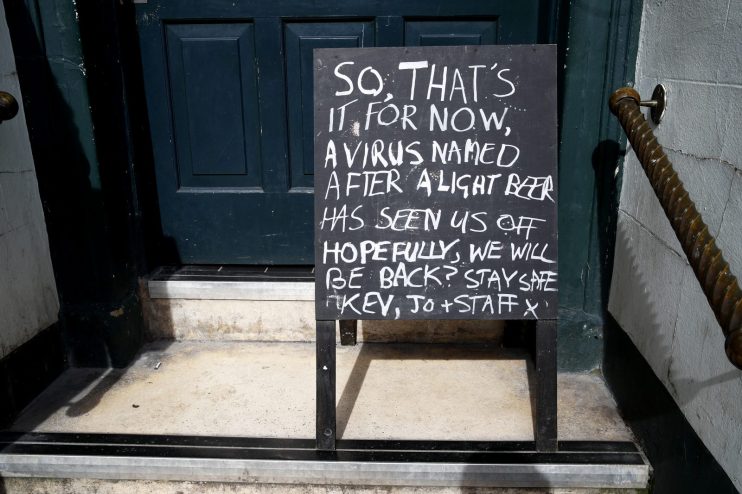It’s closing time for the nation’s pubs and bars — perhaps for good

I’ve never considered myself a great fan of pubs.
As someone who doesn’t drink beer and who came of age exactly as the golden age of pubs was on the wane (so aficionados tell me, citing the smoking ban as the moment the moment things started going downhill), the appeal has always been limited.
But, as Joni Mitchell so elegantly out it, “Don’t it always seem to go that you don’t know what you’ve got til it’s gone”.
I miss pubs. In fact, heading into the festive season, that is probably the thing I miss most about our new Covid-secure way of living.
For when we are released from England’s nationwide lockdown next week, 99 per cent of the country will still be under Tier 2 or Tier 3 restrictions. The former means no indoor mixing of households, and no popping to the pub for a drink unless it is served with a “substantial” sit-down meal, while the latter means venues must be closed completely.
This week’s giddy headlines have focused on the government’s Christmas present to the nation: five days of freedom at the end of December from the harsh restrictions we’ve been living under for months. But this offers little comfort to the hospitality industry.
For while three households will be able to gather under the same roof at Christmas, and even (thanks to the graciousness of Number 10) hug one another, they will not be permitted to mingle elsewhere.
In fact, outside of family settings, the rules won’t change at all. No Christmas Eve pints, no Boxing Day family lunch at the pub, and no trip to the local Chinese restaurant (a Christmas Day tradition for Jews worldwide).
If this is a disappointment to us as consumers, it is nothing compared to the wrath felt by the industry. As Jamie Hazeel, managing director of bar-chain Little Door, points out, companies like his make up to 40 per cent of their annual profit in December. “Fundamentally, it’s insulting to our industry to think that a few days of inter-family mixing can make up for a lost December in hospitality venues.”
Then, of course, it’s back to restrictions as usual from 28 December. New Year’s Eve, traditionally one of the biggest nights of the year for the night-time economy, is effectively cancelled.
But even more significant than that, government scientists have warned that the relaxation in rules over the Christmas period must be mitigated by tougher restrictions in January — five days of lockdown for every one day of freedom, according to one adviser. Even if that assessment is overly pessimistic, any hope of a lifeline for pubs and bars (such as the government allowing people to meet for a drink) is fading fast.
The result of all this is that, vaccine or no vaccine, the industry is now facing Armageddon. As Hargreaves Lansdown analyst Susannah Streeter puts it: “The rebound in the pub and bar sector, sparked by vaccine breakthroughs, has fizzled out with the dawning realisation that the end of lockdown will offer little short-term reprieve.’’
For businesses that have invested a vast amount of money and energy adapting to various new rules over the past nine months, the government’s dismissive attitude adds insult to injury. Screens, track and trace apps, online menus, outdoor seating, heaters — it seems no amount of effort to become Covid-secure is enough for policymakers.
“After months of unclear guidance, crippling restrictions, false starts, wasted investments and plummeting revenues, we are now facing the brutal reality that it’s not financially viable to open our venues in the peak month of the year,” laments Hazeel.
“Without changes to government policy, it’s hard to imagine that this won’t be the death knell for many operators in a sector already on the brink of collapse.”
Yes, the extended furlough scheme is helping comatose venues limp on until March, and yes, an end is in sight as the vaccine roll-out gets underway. But Downing Street has repeatedly given the distinct impression that rules on hospitality are based on optics rather than data, playing to the puritans in the gallery, which makes it impossible to count on a fixed reopening date.
And after a year of effectively being banned from operating, it is doubtful how many businesses will make it to that point. By then, the recession will have started to bite in ernest. Unemployment will be up, disposable income down, and the public may well have got out of the habit of leaving the house to go have a drink. It will be park runs followed by a stiff G&T at home forever more.
Maybe this is simply a sign that we have to change with the times. Pubs in their current recreational form have only really existed for 200 years (and night clubs only the past 70). Maybe our national obsession with transitioning from the workplace to home via a warm pint in a crowded room with a sticky floor always had an expiry date. After all, the demise of the pub industry long pre-dates Covid — in February 2019, pubs were closing their doors for good at a rate of one every 12 hours.
And like I said, I didn’t think I’d be the one complaining. But now the realisation is dawning that this could really be it for pubs, bars, night clubs — the lot. And that’s one casualty of Covid I don’t think anyone was fully prepared for.
Main image credit: Getty